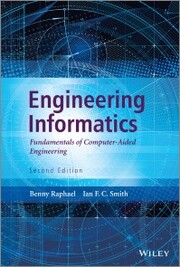-
Zusatztext
-
<p>Computers are ubiquitous throughout all life-cycle stages of engineering, from conceptual design to manufacturing maintenance, repair and replacement. It is essential for all engineers to be aware of the knowledge behind computer-based tools and techniques they are likely to encounter. The computational technology, which allows engineers to carry out design, modelling, visualisation, manufacturing, construction and management of products and infrastructure is known as Computer-Aided Engineering (CAE).</p><p><i>Engineering Informatics: Fundamentals of Computer-Aided Engineering, 2nd Edition</i> provides the foundation knowledge of computing that is essential for all engineers. This knowledge is independent of hardware and software characteristics and thus, it is expected to remain valid throughout an engineering career. This Second Edition is enhanced with treatment of new areas such as network science and the computational complexity of distributed systems.</p><p>Key features:</p><ul><li>Provides extensive coverage of almost all aspects of Computer-Aided Engineering, outlining general concepts such as fundamental logic, definition of engineering tasks and computational complexity</li><li>Every chapter revised and expanded following more than ten years of experience teaching courses on the basis of the first edition</li><li>Covers numerous representation frameworks and reasoning strategies</li><li>Considers the benefits of increased computational power, parallel computing and cloud computing</li><li>Offers many practical engineering examples and exercises, with lecture notes available for many of the topics/chapters from the ASCE Technical Council on Computing and Information Technology, Global Centre of Excellence in Computing (www.asceglobalcenter.org), providing a valuable resource for lecturers.</li><li>Accompanied by a website hosting updates and solutions</li></ul><p><i>Engineering Informatics: Fundamentals of Computer-Aided Engineering, 2nd Edition</i> provides essential knowledge on computing theory in engineering contexts for students, researchers and practising engineers.</p>
-
-
Kurztext
-
Computers are ubiquitous throughout all life-cycle stages of engineering, from conceptual design to manufacturing maintenance, repair and replacement. It is essential for all engineers to be aware of the knowledge behind computer-based tools and techniques they are likely to encounter. The computational technology, which allows engineers to carry out design, modelling, visualisation, manufacturing, construction and management of products and infrastructure is known as Computer-Aided Engineering (CAE). Engineering Informatics: Fundamentals of Computer-Aided Engineering, 2nd Edition provides the foundation knowledge of computing that is essential for all engineers. This knowledge is independent of hardware and software characteristics and thus, it is expected to remain valid throughout an engineering career. This Second Edition is enhanced with treatment of new areas such as network science and the computational complexity of distributed systems. Key features: Provides extensive coverage of almost all aspects of Computer-Aided Engineering, outlining general concepts such as fundamental logic, definition of engineering tasks and computational complexity Every chapter revised and expanded following more than ten years of experience teaching courses on the basis of the first edition Covers numerous representation frameworks and reasoning strategies Considers the benefits of increased computational power, parallel computing and cloud computing Offers many practical engineering examples and exercises, with lecture notes available for many of the topics/chapters from the ASCE Technical Council on Computing and Information Technology, Global Centre of Excellence in Computing (www.asceglobalcenter.org), providing a valuable resource for lecturers. Accompanied by a website hosting updates and solutions Engineering Informatics: Fundamentals of Computer-Aided Engineering, 2nd Edition provides essential knowledge on computing theory in engineering contexts for students, researchers and practising engineers.
-
-
Autorenportrait
- <p><b>Benny Raphael, National University of Singapore, Singapore</b></p><b>Benny Raphael</b> is an Assistant Professor in the School of Design and Environment at the National University of Singapore. His main areas of research include Computer-aided engineering, Optimization and Machine learning.<p><b>Ian Smith, EPFL, Lausanne, Switzerland<br /><br />Ian Smith</b>is Professor and Head of the Applied Computing and Mechanics Laboratory within the Civil Engineering Institute in the School of Architecture, Civil and Environmental Engineering at EPFL. He has also been active in consulting related to monitoring structures, applications of information technology, structural design, evaluation and repair of existing structures and accident analysis in Europe, North America and Japan. He was elected to the Swiss Academy of Engineering Sciences in 2004 and received the Computing in Civil Engineering Award from the Amercian Society of Civil Engineers in 2005. HE is Editor of the"Journal of Advanced Engineering Informatics", and Associate Editor of "Journal of Artificial Intelligence for Engineering Design Analysis and Manufacturing".</p>
Detailansicht
Engineering Informatics
eBook - Fundamentals of Computer-Aided Engineering
ISBN/EAN: 9781118536322
Umbreit-Nr.: 4978010
Sprache:
Englisch
Umfang: 400 S., 12.12 MB
Format in cm:
Einband:
Keine Angabe
Erschienen am 29.05.2013
Auflage: 2/2013
E-Book
Format: EPUB
DRM: Adobe DRM


